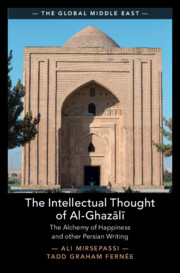Book contents
- The Intellectual Thought of Al-Ghazālī
- Reviews
- The Global Middle East
- The Intellectual Thought of Al-Ghazālī
- Copyright page
- Contents
- Acknowledgments
- Note on Transliteration
- Introduction
- 1 The Time and Life of Ghazālī
- 2 Reading Ghazālī in the West
- 3 The Poetic Imagination and the Politics of Ambiguity
- 4 The Troubled Orthodoxy in the Academic Study of Islam
- 5 A Path to Reform
- 6 A Cosmopolitan Reading of Ghazālī
- 7 Ghazālī’s Practical Ethics
- Bibliography
- Index
5 - A Path to Reform
Escape from Madrasa
Published online by Cambridge University Press: 16 January 2025
- The Intellectual Thought of Al-Ghazālī
- Reviews
- The Global Middle East
- The Intellectual Thought of Al-Ghazālī
- Copyright page
- Contents
- Acknowledgments
- Note on Transliteration
- Introduction
- 1 The Time and Life of Ghazālī
- 2 Reading Ghazālī in the West
- 3 The Poetic Imagination and the Politics of Ambiguity
- 4 The Troubled Orthodoxy in the Academic Study of Islam
- 5 A Path to Reform
- 6 A Cosmopolitan Reading of Ghazālī
- 7 Ghazālī’s Practical Ethics
- Bibliography
- Index
Summary
This chapter discusses Ghazali’s Writings in Persian and reception in Iran. Typical Ghazālī studies center his Arabic output. Yet one major work, The Alchemy of Happiness, was written originally in Persian. Ghazālī participated in a Khurasani cultural tradition. Zarrinkoub argues that Ghazālī’s mystical understanding of Islam, against prevailing literalism, influenced Islamicate civilization and culture. Zarrinkoub highlights the contribution of Persian-speaking philosophers, theologians, and scholars to the mystical and theological development of Sunni Islam. Although Iran is conventionally framed as the epicenter of Shi‘ism, Iran only became a majority Shi‘a country with the Safavid Empire in 1501. Through Persian resources we see a cosmopolitan Islam thriving where the Abbasid Empire intersected with multiple cultural revolutions, and where mysticism and established power clashed and reconciled in Ghazālī’s Sufi encounter. Ghazālī’s flight from the madrasa was a flight from orthodoxy in Islamic education, in his renunciation of the educational system. Ghazālī’s Sufism was partly a critique of the dogmatic understanding of Islam common among the ‘ulama.’
Keywords
- Type
- Chapter
- Information
- The Intellectual Thought of Al-Ghazālī , pp. 165 - 179Publisher: Cambridge University PressPrint publication year: 2024

